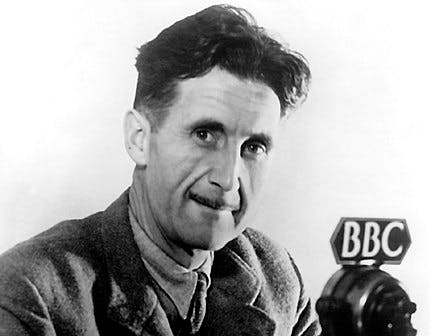George Orwell, Call Your Office: Putin Is Trying To Turn ‘Nineteen Eighty-Four’ Against the West
The claim that Orwell’s classic lampooned not the USSR but its free foes comes as Putin’s regime cracks down on speech and expression and cranks up propaganda relating to its invasion of Ukraine.

Vladimir Putin’s Russia is here to correct the literary record. A spokeswoman for the Moscow strongman argued that George Orwell’s “Nineteen Eighty-Four” is not about the perils of totalitarian communism, but rather an indictment of the lies of the liberal West.
“Orwell did not write about the USSR, it wasn’t about us,” the Russian foreign ministry spokeswoman, Maria Zakharova, asserted. “He wrote about the society in which he lived, about the collapse of the ideas of liberalism. And you were made to believe that Orwell wrote it about you.”
Mrs. Zakharova shared that novel interpretation during public comments on Sunday, the Guardian reports. Orwell, who was born in 1903 and died in 1950, was a fierce critic of the Soviet Union under Joseph Stalin.
The claim that Orwell’s classic lampooned not the USSR but its free foes comes as Mr. Putin’s regime cracks down on speech and expression and cranks up propaganda relating to its invasion of Ukraine. Anti-war protesters have been arrested for holding up blank signs.
The spokeswoman was answering a question that asked how Russians should respond to friends and relatives abroad who wonder if those in the motherland are inhabiting a contemporary “Nineteen Eighty-Four.”
At the outset of the war in Ukraine, the Duma passed a law penalizing the spread of “fake” information about the conflict with 15 years in prison. Belarus, a neighboring country governed by a strongman loyal to the Kremlin, last week banned sales of “Nineteen Eighty-Four.”
In Russia, the Moscow Times reports that one bookseller observed that sales of Orwell’s book were up 75 percent last month, indicating that the fable is resonating, either for or against the current regime.
Mrs. Zakharova went on to explain, “For many years we believed that Orwell described the horrors of totalitarianism. This is one of the biggest global fakes.” She argued that “Orwell wrote about the end of liberalism. He depicted how liberalism would lead humanity to a dead end.”
Eric Arthur Blair, known by his pen name of George Orwell, was born in India. He was injured in the Spanish Civil War, served as a policeman in Burma, and reported on World War II for the BBC.
Orwell’s reputation as one of the vital English writers of his, or any, century is secured in his journalism and books. Works like “Down and Out in Paris,” “Homage to Catalonia,” “Animal Farm,” and “Nineteen Eighty-Four” have secured Orwell’s reputation.
Orwell was an atheist, a humanist, and a self-described “Tory anarchist.” He was weaned on socialism during his time reporting on the battle against Generalissimo Franco, which ended up giving to his politics an anti-Stalinist bent. He was a member of England’s Independent Labour Party.
While Mrs. Zakharova told her audience “it’s you in the west who live in a fantasy world where a person can be canceled,” it is likely that Orwell had both Stalin and Hitler firmly in his mind’s eye when, in 1949, he wrote “Nineteen Eighty-Four.” It was his final book, and is his only surviving manuscript.
In “Nineteen Eighty-Four,” Orwell not only crafted a dystopian parable for repression, he also gave English a lexicon for describing totalitarianism. Words and phrases like “Big Brother,” “doublespeak,” and “Thought Police,” all Orwell’s inventions, have come to serve as shorthand for the depredations of an overweening state.
The book’s most famous phrase, which illustrates the corruption of thought under the thumb of totalitarianism, was directly taken from Soviet propaganda: “2+2=5.” It was featured during the second of Stalin’s five year plans, which “modernized” Russia’s economy at the price of millions of dead.
Some see a linguistic analogue in current Russian legislation that prohibits referring to the current assault on Ukraine as a “war.” It is instead labeled a “special military operation,” or “SMO.”
The Economist reports that outside the West, Russia’s propaganda effort appears to be succeeding. An analysis of tweets found that “after suspicious accounts posted pro-Russian content, the share of their followers’ tweets favoring Russia also tended to rise.”
In his essay “Politics and the English Language,” Orwell writes of “language as an instrument for expressing and not for concealing or preventing thought.” For the Kremlin, it appears as if not only cannons, but also classics, are now conscripted to the cause.

